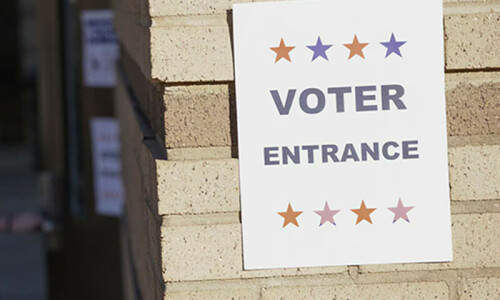LONDON: Deadly attacks on US forces in Iraq have so far been the work of disparate insurgents, but anger at the US-led occupation could spark broader resistance.
“It’s not yet a guerrilla war,” said Mustafa Alani, an Iraqi analyst at London’s Royal United Services Institute (RUSI).
“There is no central control, it’s not a unified movement and the attacks are concentrated in the western part of Iraq.”
This partly chimes with the views of General Richard Myers, chairman of the US Joint Chiefs of Staff, who said at the weekend that resistance was fragmented and restricted to a triangle from Baghdad to the north and west.
He identified five groups behind assaults that have killed 29 US soldiers since President George W. Bush declared major combat over on May 1, three weeks after Saddam Hussein’s fall.
These were Saddam loyalists, foreign fighters from Syria and Iran, the Ansar al-Islam group said to be linked to Al Qaeda, criminals freed by Saddam before the war, and extremists.
Analysts agreed the resistance was fractured, but said US officials, at least in public, were understating the growing resentment of many Iraqis at the unsubtle tactics of American troops grappling to impose control in a post-war power vacuum.
“I see this as Somalia writ large,” said Jonathan Stevenson, an American counter-terrorism expert at London’s International Institute for Strategic Studies. “So far atomized groups are becoming increasingly hostile to the American occupation.”
Much more is at stake for the United States in Iraq than in Somalia, where a US relief mission ended in disaster in 1993 after 18 US troops were killed in a firefight with militiamen.
Stevenson said the Americans were meeting a “creeping but rather strong nationalism” in Iraq, where they were failing to deliver on perceived promises to improve living conditions and hand the country back to Iraqis after 35 years of Baathist rule.
US firepower could suppress any direct military challenge from what he described as a nascent insurgency, but this would not produce the stability the Americans sought.
“They need a political solution that vindicates the war and wins the peace. They’re still groping for how to do that.”
Stevenson said there was no solid indication yet that Al Qaeda or other “transnational terrorists” were meddling in Iraq, but argued that the US presence there was a tempting target.
“Even if they haven’t yet penetrated Iraq, they would like to do so and hook up with indigenous extremists there,” he said.
US administrator Paul Bremer has said patience is needed to rebuild a shattered country, but time is not on his side.
“If the political failure continues, along with the difficulty in providing services, the economic crisis, the problem of the Iraqi army, some sort of organized resistance movement could develop into guerrilla warfare,” Alani said.
He said US troops had made serious blunders, notably in the town of Falluja, west of Baghdad, where he said anti-US attacks had begun as revenge for the killings of 15 youthful demonstrators by American forces in late April.
Alani said the Americans should have made amends in line with the town’s tribal, conservative traditions by sending mediators to apologize, pay blood money and perhaps promise to build a new school in memory of the dead youngsters.
“They did nothing and they have paid a high price,” he said, referring to attacks in the Falluja-Ramadi area, where he said radicals had later joined forces with vengeful townsfolk. “You can’t kill people and just walk away.”
Toby Dodge, an Iraq expert at Britain’s Warwick University, said events in Falluja and elsewhere proved that the US military had no understanding of Iraqi society.
He said that while remnants of Saddam’s security services, drawn mainly from his home area of Tikrit, were behind much of the anti-US violence, non-Tikriti Baathists might also be orchestrating attacks in line with the party’s ideology.
“These people believe in the Baath party’s worship of a strong state, its chauvinistic nationalism directed against outsiders, and its paranoia of imperialism,” Dodge said.
He said intrusive searches by British paratroopers of homes in a southern Shia town had led to the killings of six British military police there, but there were few signs that majority Shias were actively combating the occupation yet.
“The Shias are playing a waiting game,” he said. “But they are also arming and organizing.”
The Shias, long oppressed by Saddam’s Baathists, want their share of power in the new Iraq, but for now are waiting to see what political structure emerges.
“If they don’t get what they believe they deserve, we will get an intifada (uprising),” Alani predicted.
Classic counter-insurgency tactics require much more than the overwhelming force that US troops have largely relied on in efforts to crack down on Iraqi gunmen, bombers and saboteurs.
Ellie Goldsworthy, head of the UK Armed Forces programme at RUSI, said it was vital to stop the one per cent of Saddam loyalists from gaining recruits among the 99 per cent of Iraqis who might be disgruntled, but not sworn foes of the Americans.
“I’m aghast at how ineptly the Americans have handled this,” she said. “Some things are difficult to handle, others are cheap and easy, like smiling and talking to people with respect — you don’t wear sunglasses when you are trying to build rapport.”
Goldsworthy said the US military was focused on protecting its own forces and loathe to take risks to create a more benign environment, as British forces have tried to do in the south.
“The American approach to dealing with Iraqis is very similar to the way Israelis deal with Palestinians,” she said.—Reuters












































Dear visitor, the comments section is undergoing an overhaul and will return soon.